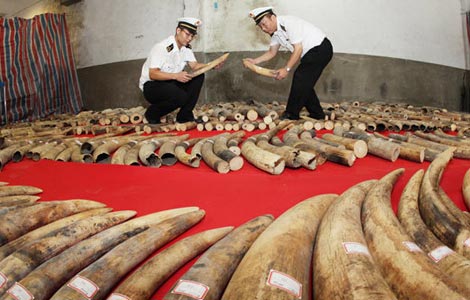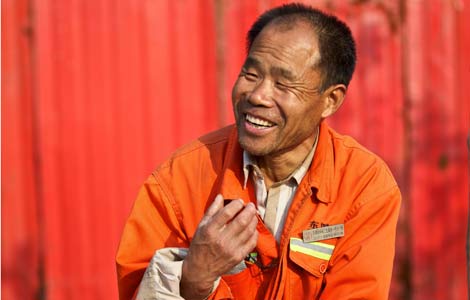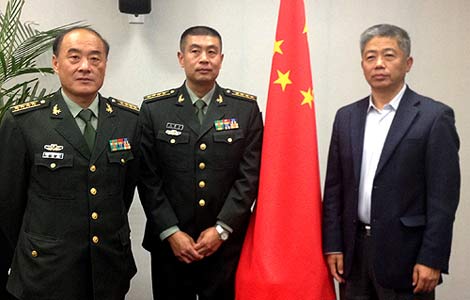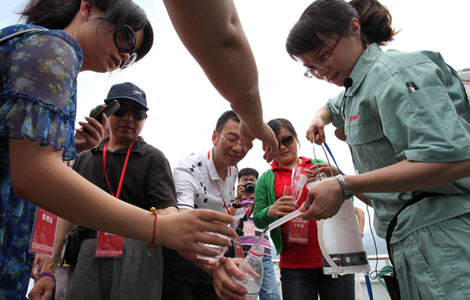
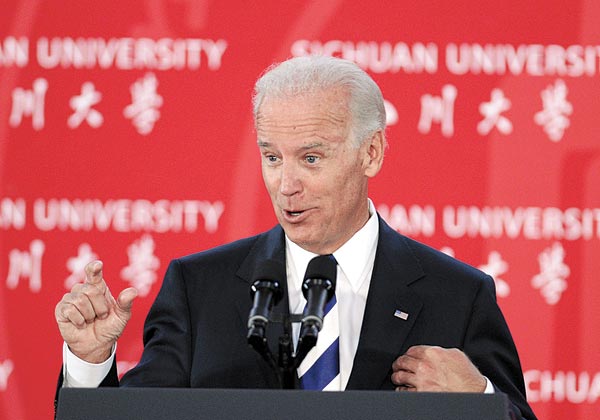 |
|
US Vice-President Joe Biden speaks to students at Sichuan University in Chengdu on Aug 21, 2011. Biden will visit China, Japan and South Korea next month. Peter Parks / Agence France-Presse |
Visits to Beijing, Tokyo and Seoul part of effort to demonstrate interest in region, say experts
As US Vice-President Joseph Biden prepares for his East Asian trip amid a bitter row between Beijing and Tokyo, the issue of how the United States and China, the world's two largest economies, handle their relationship has again moved to the front burner.
The White House announced on Monday that Biden will visit Japan, China and South Korea in the first week of December.
"One reason for the visit is to reassert that the Obama administration still attaches great importance to the region," said Jia Xiudong, a senior researcher on international affairs at the China Institute of International Studies.
"As we all know, Obama's absence in two key regional summits has dealt a heavy blow to Washington's image of caring about Asia."
US President Barack Obama canceled visits to two Asian summits and four Asian nations last month during the US government shutdown.
The decision has had Asian countries re-examining Washington's strategy and capabilities in the Asia-Pacific region, observers said.
Hugh White, a professor of strategic studies at the Australian National University and a former senior defense official in Australia, described the US pivot to Asia as a failure.
The US should replace the pivot with a policy that works, he said.
White expressed his concern over a possible brewing rivalry between China and the US. He said Australia does not want to choose sides in its relationships with the US and China, and he believes the whole of Asia thinks the same way.
For Washington, the first challenge in the Asia-Pacific region might be the dispute between Beijing and Tokyo over the Diaoyu Islands.
The Wall Street Journal stirred public opinion in China with an article published on Thursday that backs Japan's position on the islands and makes a "rare, direct call" on the US government to take a position on the issue. The office of the US defense secretary said on Friday that Washington's position has not changed.
The US has long stated that it does not take a stand on the ultimate sovereignty of the islands, but that because the islands are under Japan's administrative control, they "fall under United States treaty obligations to Japan".
Japanese media quoted a government source as saying that Biden's talks with Japanese leaders will touch upon the Diaoyu Islands.
But Jia said Biden will be "very cautious on any comment on the Diaoyu Islands during the trip".
"The relationship with China is the most important one for the US in the region, while Japan is its close ally. The US has to keep a balance on the issue and avoid stirring things up. Or that will greatly offset the effect of the visit."
Trip to Beijing
Commenting on the second stop of Biden's visit, USA Today described the China stop on Monday as being "of particular interest".
Biden, who last visited China in August 2011 at the invitation of then-vice-president Xi Jinping, has a good personal relationship with Xi. Biden accompanied Xi through most of his five-day US visit in 2012.
From another angle, Biden will be the most senior US official to visit China after the upcoming Third Plenum of the 18th Communist Party of China Central Committee due to be held from Nov 9 to 12, at which a number of economic reform measures that show the country's direction in the next decade are expected to be unveiled.
Jia said Biden's China visit will focus more on economic cooperation, though his trip right after the CPC meeting might be a "coincidence" because "there are so many factors deciding the date of a foreign visit".
"He is also here to show Washington's commitment to developing ties with Beijing, now that Obama cannot make a China trip this year."
Biden is the highest-level US official to visit China since the new Chinese leadership came into office in March.
Bonnie Glaser, a senior adviser on Asia at the Center for Strategic and International Studies, a think tank in Washington, said implementing the agenda items agreed upon at the 5th Strategic and Economic Dialogue should be a high priority.
The items include starting formal negotiation of a bilateral investment treaty, which both sides find of great importance.
Glaser also expected the two sides to exchange views on development of their policies toward the Asia-Pacific region.
"China should explain its just-held high-level meeting on periphery diplomacy, and Biden can provide an update on the US rebalancing to Asia," Glaser said.
Contact the writers at
chenweihua@chindailyusa.com and lixiaokun@chinadaily.com.cn
